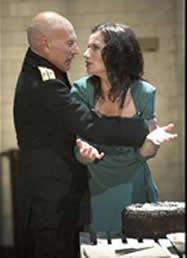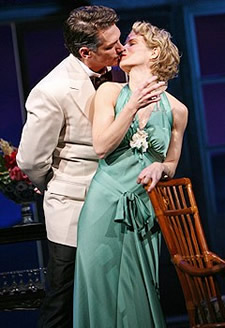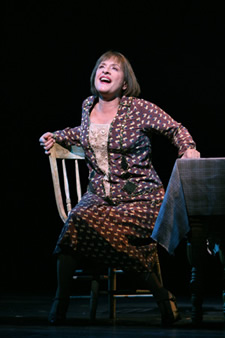HotReview.org Editor's
Picks
Shows Worth Seeing:

Macbeth
By William Shakespeare
Lyceum Theatre
149 W. 45th St.
Box office: (212) 239-6200
After four scenes in which
Patrick Stewart has seized hold of the role of Macbeth with all
the furious strength of a leaping predator, it is positively thrilling
to see Kate Fleetwood doing exactly the same with Lady Macbeth.
All the half-dozen good productions of this play I have
seen have had one or another weak player at the top. When both
performances are as strong as this, though—as sharply delineated,
forcefully delivered, complementary in their different paranoias
and bonded with real chemistry—then the terrible majesty
of this terrifying masterpiece comes into focus. The setting by
Anthony Ward—a dingy, tiled basement with stainless steel
appurtenances resembling an autopsy room—is fabulously creepy
and interestingly flexible, even if it can’t really stretch
to fit all the play’s locations. The witches are cleverly
transformed into a sort of malevolent chorus: now homicidal nurses,
now maidservants from hell. The show isn’t perfect. There
are two unfocused performances (of Malcolm and Lady Macduff).
And the modern totalitarian (Stalinist? fascist?) background implied
by the 1930s costumes, props and projected film clips is a tired
trope by now. Directors use it to bring the reality of arbitrary
power closer to home, but it makes nonsense of all praise for
leaders in the play (including Duncan and Malcolm) and reduces
everything to a blanket cynicism that isn’t what Shakespeare
wrote and feels too easy. Still, so much is right in this show,
particularly in the aspects hardest to get right, that the problems
pale in comparison. This is a rare event, not to be missed.
----------------------------------

South Pacific
By Richard Rodgers and Oscar Hammerstein II
Vivian Beaumont Theatre
150 W. 65th St.
Box office: (212) 239-6200
There are many musical lovers
who have known South Pacific only from the 1958 movie
Joshua Logan directed starring Mitzi Gaynor and Rossano Brazzi.
That’s because the Rodgers and Hammerstein Organization
has kept a tight lid on professional stage productions, fearing,
I suspect, that the time was never quite right for a fresh blast
of American optimism and international benevolence in the form
of this Michener-inspired tale of sailors and airmen holed up
on a Pacific island while itching to get into the war against
the Japanese. That judgment may have been correct. But the result
has been that those too young to have seen the original Broadway
production starring Mary Martin and Ezio Pinza, which ran from
1949 to 1953, have had to assess this work mainly on the basis
of its lovely songs and a really dumb Hollywood adaptation that
gives no sense of why anyone was ever interested in the drama.
R&H were justifiably proud of how their shows worked as drama.
And this one has a lot to say to the present moment, which has
all but lost faith in the very notion of a “good war.”
Even more than other musicals, South Pacific pales on
film, because almost all its transitions (scene to scene, speech
to song, mood to mood) are crucially dependant on conventions
we readily accept onstage but find childish and artificial onscreen.
So it’s wonderful to see it back in its full living glory
in this splendid new production directed by Bartlett Sher. With
her blonde pixie curls and peppy insouciance, Kelli O’Hara
is exactly the right actress for Ensign Nelli Forbush—a
wholesome hayseed, trumpet-voiced beauty who feels transported
out of 1953 to make men want to marry her rather than just sleep
with her. And Paulo Szot, the Brazilian opera star who plays the
French planter Emile de Becque, is a great find: a gorgeous baritone
with an easygoing machismo that projects moral uprightness. South
Pacific will not make you trash your VCR or DVD player, but
it will make you glad you left them home for a night.
-----------------------------------

Gypsy
By Arthur Laurents, Julie Styne and Stephen Sondheim
St. James Theatre
246 W. 44th St.
Box office: (212) 239-6200
Ethel Merman, around whom
the musical Gypsy was built in 1958-59, reportedly once
said she would shoot anyone else who got the lead part of Rose.
Patti Lupone, by contrast, behaves as if the role were hers by
right, passed to her as a sort of torch. This isn’t all
bad, though it had me worried for a half hour or so. Rose is,
of course, the domineering gorgon of a stage-mother taken from
the autobiography of Gypsy Rose Lee, who pushes her children to
pursue the sort of stage career she never had herself. Now in
its fourth Broadway revival, Gypsy seems to need no other
reason for returning to New York than that another diva of a certain
age has achieved the clout to want it to. For the first few scenes
of this new incarnation, which Arthur Laurents directed, Lupone
seemed to me to be phoning it in. She wasn’t connecting
with her fellow actors (even a dominatrix has to connect through
domination) and she seemed downright impatient with the business
of establishing background about her family and life before vaudeville,
etc. Once the family gets on the road, though, Lupone finds her
equilibrium and gathers a head of steam that is blistering by
intermission. She isn’t as sexy a Rose as either Bernedette
Peters or Tyne Daly, but strangely enough (given her problems
early on) she makes up for it in the end with realism. Any Rose
is ultimately measured by what she makes of the big character-defining
numbers “Some People,” “Everything’s Coming
Up Roses” and “Rose’s Turn,” and Lupone
makes them into a kind of three-part, dynamic daydream that she
dares everyone else to interrupt. There’s something magnificently
cracked, rather than iron-willed, in this portrayal, which acquires
an emotional weight you don’t expect. The transformation
of Laura Benanti from shy and sexless daughter Louise into the
voluptuous star stripper Gypsy Rose Lee is also a delightful marvel.
